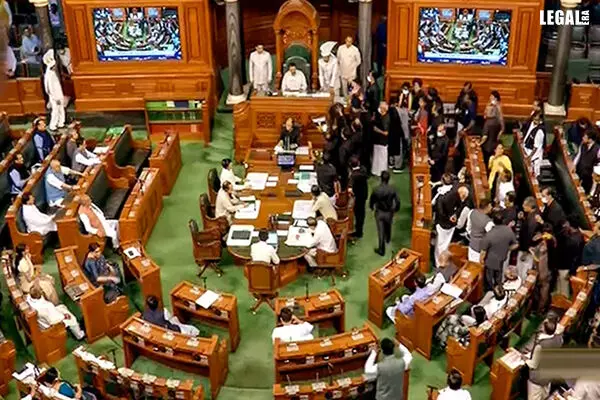- Home
- News
- Articles+
- Aerospace
- Artificial Intelligence
- Agriculture
- Alternate Dispute Resolution
- Arbitration & Mediation
- Banking and Finance
- Bankruptcy
- Book Review
- Bribery & Corruption
- Commercial Litigation
- Competition Law
- Conference Reports
- Consumer Products
- Contract
- Corporate Governance
- Corporate Law
- Covid-19
- Cryptocurrency
- Cybersecurity
- Data Protection
- Defence
- Digital Economy
- E-commerce
- Employment Law
- Energy and Natural Resources
- Entertainment and Sports Law
- Environmental Law
- Environmental, Social, and Governance
- Foreign Direct Investment
- Food and Beverage
- Gaming
- Health Care
- IBC Diaries
- In Focus
- Inclusion & Diversity
- Insurance Law
- Intellectual Property
- International Law
- IP & Tech Era
- Know the Law
- Labour Laws
- Law & Policy and Regulation
- Litigation
- Litigation Funding
- Manufacturing
- Mergers & Acquisitions
- NFTs
- Privacy
- Private Equity
- Project Finance
- Real Estate
- Risk and Compliance
- Student Corner
- Take On Board
- Tax
- Technology Media and Telecom
- Tributes
- Viewpoint
- Zoom In
- Law Firms
- In-House
- Rankings
- E-Magazine
- Legal Era TV
- Events
- Middle East
- Africa
- News
- Articles
- Aerospace
- Artificial Intelligence
- Agriculture
- Alternate Dispute Resolution
- Arbitration & Mediation
- Banking and Finance
- Bankruptcy
- Book Review
- Bribery & Corruption
- Commercial Litigation
- Competition Law
- Conference Reports
- Consumer Products
- Contract
- Corporate Governance
- Corporate Law
- Covid-19
- Cryptocurrency
- Cybersecurity
- Data Protection
- Defence
- Digital Economy
- E-commerce
- Employment Law
- Energy and Natural Resources
- Entertainment and Sports Law
- Environmental Law
- Environmental, Social, and Governance
- Foreign Direct Investment
- Food and Beverage
- Gaming
- Health Care
- IBC Diaries
- In Focus
- Inclusion & Diversity
- Insurance Law
- Intellectual Property
- International Law
- IP & Tech Era
- Know the Law
- Labour Laws
- Law & Policy and Regulation
- Litigation
- Litigation Funding
- Manufacturing
- Mergers & Acquisitions
- NFTs
- Privacy
- Private Equity
- Project Finance
- Real Estate
- Risk and Compliance
- Student Corner
- Take On Board
- Tax
- Technology Media and Telecom
- Tributes
- Viewpoint
- Zoom In
- Law Firms
- In-House
- Rankings
- E-Magazine
- Legal Era TV
- Events
- Middle East
- Africa
Lok Sabha passes Competition (Amendment) Bill, 2022

Lok Sabha passes Competition (Amendment) Bill, 2022
The move will open the doors for harsher punishments for giant technology firms
The Lok Sabha has passed amendments to the competition law for stricter compliance, including empowering the antitrust regulator to impose penalties on global turnovers of erring firms.
As part of the Competition (Amendment) Bill, 2022, the proposed changes were cleared amid pandemonium in the lower house of the Parliament. These include expanding the scope of sanctions to entities collaborating in cartelization.
Presently, the Competition Commission of India (CCI), cannot impose penalties on corporate entities based on their global turnover. The penalties are restricted to the company’s sales in the relevant market.
The amendments also make compliance easy by allowing the antitrust watchdog to regulate mergers and acquisitions based on the value of transactions with a Rs.2,000 crore threshold. That is if the target entity has substantial business operations in India.
It also proposed that CCI would need to take a view within 30 days on the likelihood of a combination of mergers and acquisitions causing an adverse effect on the competition.
The Bill was introduced in the Lok Sabha on 5 August 2022. After 10 days, it was referred to the parliamentary committee on finance. Based on the panel’s recommendations, which submitted its report in December, the government moved the Bill on 8 February with additional amendments.
Commenting on the move, Unnati Agrawal, the partner at IndusLaw said, it was a “timely” and “laudatory” development to align the Competition Act in line with the changing economic and business reality in India and provide CCI with more teeth and flexibilities.
She stated, “The introduction of major amendments, such as deal value thresholds, will bring transactions involving ‘asset lite’ and ‘low revenue’ companies (which were previously not notifiable), under CCI’s scrutiny.”
She furthered it would be interesting to see if the Rajya Sabha would endorse the introduction of the highly contentious provisions. Agarwal referred to the provisions, including the computation of penalties based on global turnover, which would result in higher penalties for global multi-product companies.
Avaantika Kakkar, the partner and competition law head at Cyril Amarchand Mangaldas commented, “India would now have a much-needed commitment and settlement regime, which would be applicable to contraventions related to anti-competitive vertical restraints and abuse of dominance.”
She added, “In terms of merger control, the Bill has introduced a deal value threshold, which will enable CCI to review transactions depending upon the value of a transaction alone, provided that the target enterprise has substantial business operations in India.”
Commenting on penalties based on the global turnover of an entity, Kakkar said, “From a business point of view, the consideration of total turnover may lead to ‘unfair and punitive’ outcomes and would also lead to discrimination between enterprises who commit a similar contravention but are penalized differently depending on the expanse of their business.”
“The intention to actively participate has been introduced for assessing hub and spoke cartels. Such an inclusion not only increases the number of parties that can be included in a hub and spoke cartel investigation, but also increases the level of subjectivity and discretion of the investigating authority,” she remarked.



